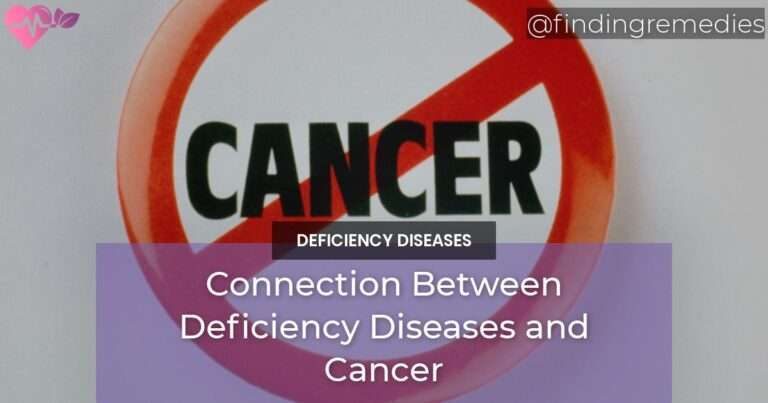Deficiency diseases result from insufficient intake or absorption of certain nutrients, leading to a range of health problems. On the other hand, cancer is a complex disease characterized by uncontrolled cell growth and the ability to spread to other parts of the body.
Although deficiency diseases and cancer are two distinct health conditions, research has shown that they are linked in several ways.
In this article, we will look at the connection between deficiency diseases and cancer.
Table of Contents
What are Deficiency Diseases?
Deficiency diseases occur when the body doesn’t get enough of certain nutrients, including vitamins, minerals, and other essential compounds. Common deficiency diseases include:
- Scurvy: caused by a lack of vitamin C leading to fatigue, muscle weakness, and skin problems.
- Rickets: caused by a lack of vitamin D leading to brittle bones and delayed growth.
- Anemia: caused by a lack of iron leading to fatigue, weakness, and shortness of breath.
Causes of Deficiency Diseases
Deficiency diseases are caused by a range of factors, including poor nutrition, malabsorption, and certain medical conditions. Chronic alcoholism, kidney disease, and gastrointestinal disorders can all contribute to the development of deficiency diseases.
Symptoms of Deficiency Diseases
Symptoms of deficiency diseases can vary depending on the type of nutrient deficiency. Common symptoms include:
- Weakness and fatigue
- Muscle cramps
- Skin problems
- Delayed growth and development
What is Cancer?
Cancer is a disease characterized by the uncontrolled growth and spread of abnormal cells. With over 100 types of cancer, the disease can affect any part of the body.
Causes of Cancer
Cancer is caused by a combination of genetic and environmental factors. Exposure to certain substances, including tobacco smoke and radiation, can increase the risk of cancer. Additionally, a weakened immune system, viral infections, and family history can contribute to the development of cancer.
Symptoms of Cancer
The symptoms of cancer depend on the type and stage of the disease. Common symptoms of cancer include:
- Fatigue
- Unexplained weight loss
- Pain
- Changes to the skin or moles
Link Between Deficiency Diseases and Cancer
Research has shown that there is a strong link between nutrient deficiencies and cancer. A diet that is deficient in certain nutrients can increase the risk of cancer, while a diet rich in essential nutrients can help prevent the disease.
How Deficiency Diseases Increase Cancer Risk
Deficiency diseases can increase the risk of cancer by weakening the immune system and damaging DNA. When the body is deficient in essential nutrients, it may not be able to repair damaged cells or fight off infections, making it more vulnerable to cancer.
Nutrients that Reduce Cancer Risk
Consuming a diet rich in certain nutrients has been shown to help reduce the risk of cancer. Some essential nutrients to include in a cancer prevention diet include:
- Vitamin D: helps to regulate cell growth and has been shown to reduce the risk of several types of cancer.
- Iron: helps to transport oxygen throughout the body and is essential for healthy cell growth.
- Zinc: supports a healthy immune system and helps with wound healing.
Types of Deficiency Diseases Linked to Cancer
Certain types of deficiency diseases have been linked to an increased risk of cancer. These include:
Vitamin D Deficiency and Cancer
Vitamin D plays a crucial role in regulating cell growth and supporting a healthy immune system. Research has shown that a deficiency in vitamin D can increase the risk of several types of cancer, including breast, colon, and prostate cancer.
Iron Deficiency and Cancer
Iron is essential for healthy cell growth and is involved in a range of cellular processes. A deficiency in iron can result in anemia and has been linked to an increased risk of several types of cancer, including colon, lung, and esophageal cancer.
Prevention and Treatment
Prevention of Deficiency Diseases and Cancer
Preventing deficiency diseases and cancer involves a combination of healthy lifestyle choices and regular medical check-ups. Some essential tips for prevention include:
- Eating a balanced diet rich in essential nutrients
- Maintaining a healthy weight
- Getting regular exercise
- Reducing exposure to harmful substances, including tobacco smoke and radiation
- Getting regular cancer screenings
Treatment of Deficiency Diseases and Cancer
Treatment of deficiency diseases and cancer will depend on the type and severity of the condition. Treatment options for deficiency diseases may include dietary changes or supplements, while cancer treatment may involve surgery, chemotherapy, radiation therapy, and immunotherapy.
In conclusion, deficiency diseases and cancer are two distinct health conditions that are linked in several ways. While a deficiency in certain nutrients can increase the risk of cancer, consuming a diet rich in essential nutrients can help prevent the disease. By making healthy lifestyle choices and getting regular medical check-ups, individuals can reduce their risk of both deficiency diseases and cancer.

